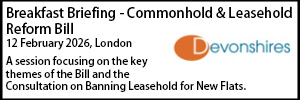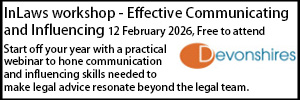- Details
Getting a job as a paralegal: tips and interview techniques
Amanda Hamilton considers what makes a successful paralegal applicant, and provides interview tips.
When attending an interview in the public sector, you should remember that you are one of many applicants. These jobs are highly sought after and there will be steep competition. So you need to shine and distinguish yourself from others.
There are a number of preparatory things you can do prior to the interview, and a number of fundamental principles to bear in mind.
The experience of being interviewed, as we all are aware, is exceptionally stressful even for the most experienced among us, and at whatever age. It certainly doesn’t get any easier.
Within the public sector, it is most likely you will face an interview panel of two or more people and the fear-factor may even make you forget your own name!
You are being scrutinised from the moment you walk into the interview room. That’s why it’s so important to make a first good impression, and the only way to do this, is to remember the basics, and have the confidence to do so!
So what are the basic principles of interview technique for gaining a job within the public sector? Well, before we go into this in detail, let’s try to dispel some of the myths to help you understand the one main principle of attending an interview, which is:
You wouldn’t be asked to attend if your qualifications/experience in your CV or application form hadn’t already spoken for itself. In other words, you don’t have to prove your right to be there. You are attending on merit, just like everyone else. You have a level playing field with all other applicants. So the question arises: what is the purpose of being interviewed? The answer is quite simple: to see if your face/personality fits with what they are looking for. In other words, what sort of person are you?
A quick word on CV’s: this is your calling card, a marketing tool, a way of saying to the recruiter: ‘I am so interesting that you must interview me’! Why not add in things you have done which catch the eye? For example, as an interviewer, I sometimes look at the ‘Hobbies’ or ‘Interests’ section first, before looking at the person’s ‘Work Experience’. It tells me a lot about the person - what they have done or like doing.
So, on the basis of understanding these premises, we can now discuss some tips to help you get through this process.
Firstly, whether you fit with what the interviewers want is outside your control. You have no idea about what they are specifically looking for in an applicant. Sometimes, and this comes from personal experience as an interviewer, you, the applicant, may change the interviewers’ mind halfway through the interview. So, it is fundamentally important that you relax and let your true personality shine through.
The panel of interviewers are keen to find the right person, they are looking for reasons to employ you – and reasons to reject you. It’s not personal. They need to be sure your experience and knowledge is right, and they need to be sure you are the right fit. No one wants to be, or to have, a square peg in a round hole – that’s a lose-lose for all concerned.
Working in the public sector suits a certain type of personality. It’s very different from the private sector, and my experience is that most people suit one or the other – not both. I have a friend who tried desperately to get a job in the public sector, but when she eventually got there, she realised it simply wasn’t for her. On the outside, her paralegal work appeared to be the same, but on the inside, within the organisation, the attitude, behaviour, ethos and culture was very different – and it didn’t fit with her personality. So, don’t take rejection personally – the interview panel is looking for a ‘fit’ and if you don’t ‘fit’ then it’s best for you that they don’t employ you!
Secondly, I have, as an employer, interviewed many individuals. The following are examples of a few interviews that went wrong from the applicants’ point of view. It was for a senior administrative and customer services role. My panel and I had made a few notes as to what we were looking for. The main part of the job description was that the applicant must have a legal background or have experience working in a legal environment.
Applicant 1: had a week to prepare for the interview. Was currently working as a paralegal. She had not taken any care in how she looked nor in the clothes she wore. She entered the room and addressed me (her interviewer) as ‘Dear’. Having asked her whether she knew what we did, she shook her head. I gave her a brief synopsis of our organisation, at the end of which, I asked her if she had any questions. She answered by saying: ‘Yes. How much are you going to pay me Dear?’. I ushered her out of the interview room and said that we will let her know the outcome after we had finished interviewing all the applicants. A week later, I received a phone call from her asking once again how much we were going to pay her, at which point I said that we had decided not to employ her. End of call.
Applicant 2: again, had a week to prepare for the interview. A law graduate. Came in, sat down, didn’t say anything. Her head was down and in answer to my question whether she knew what our organisation did, she shook her head. After proceeding to give her a brief outline, I asked her whether she had any questions. She shook her head. The interview was over.
Applicant 3: a law graduate. He strutted into the interview room and lazily planted himself over the chair. He was not dressed appropriately. He did not acknowledge me in any way other than by saying ‘awlright’. The interview was over almost before it began although I went through the motions.
Applicant 4: was a last minute reluctant addition to the list of applicants as the recruitment agency had expounded her virtues. She had no legal training or experience but looked great. She came across as open about her lack of experience and being willing to learn very quickly. She had a great personality and had checked our website, was aware of what we did, and how her role would fit in. She got the job.
Needless to say, that the first three applicants failed in their ‘effort’ to gain employment. The first was inappropriate in every way. The second was ineffectual, and the third was downright arrogant. The fourth was not what we thought we were looking for, but was so open and honest that we changed our minds. She remains in our employ after five years and has become a senior member of staff.
So what tips can we extrapolate from these interview examples?
There are some fundamental tips to bear in mind:
- Always dress for the part. I know this is for most people a basic, but it is surprising how many forget it.
- Remember to have eye contact with your interviewers. This helps the interviewers gain an insight into who you are.
- Interviewers usually make up their minds about interviewees within the first 30 seconds of seeing them, so first impressions can go a long way to assisting them to understand who you are. This is important for an interviewer as it makes them feel comfortable and makes their job easier.
- Let your personality shine through as this also helps the interviewer.
- Always research the job spec beforehand and the set-up of the local authority or department to find out exactly what they do, their hierarchy etc: – there is no excuse these days not to do so.
- Have at least one or two questions up your sleeve as they will inevitably ask you whether you have any. If you can fire off a few relevant questions, it shows enthusiasm.
- Remember that you are interviewing them as much as they are interviewing you, as you need to ascertain whether this is the kind of environment/people you wish to work in/with.
- If you fail to get the job, it’s not about you but about the department and what they are looking for, so move on. There is the perfect job out there for you – it’s just a question of finding it.
By preparing properly and following the tips above, you will put yourself in the best position to get the job. But remember, you are not right for every public sector job and every job is not right for you. So, if this isn’t the one – move on to the next. The public sector can be a great place to work – but you need to find your niche, a place where you will fit, and can really shine.
Amanda Hamilton is Chief Executive of the National Association of Licenced Paralegals (NALP), a non-profit Membership Body and the only Paralegal body that is recognised as an awarding organisation by Ofqual (the regulator of qualifications in England). Through its Centres, accredited recognised professional paralegal qualifications are offered for a career as a paralegal professional.
Legal Director - Government and Public Sector
Commercial Lawyer
Head of Legal
Solicitor - Civil and Criminal Litigation
Solicitor - Civil and Criminal Litigation
Child Care Lawyer
Solicitor - Contracts and Procurement
Litgation Solicitor
Locum roles
 Cornerstone Barristers roundtable on the Draft NPPF: Plan-Making Provisions
Cornerstone Barristers roundtable on the Draft NPPF: Plan-Making Provisions
09-02-2026 2:00 pm
London
 Breakfast Briefing – Commonhold & Leasehold Reform Bill – a session focusing on the key themes of the Bill and the Consultation on Banning Leasehold for New Flats - Devonshires
Breakfast Briefing – Commonhold & Leasehold Reform Bill – a session focusing on the key themes of the Bill and the Consultation on Banning Leasehold for New Flats - Devonshires
12-02-2026 8:30 am
London
 Planning, Property and Power Webinar Series: Strategic energy planning - Landmark Chambers
Planning, Property and Power Webinar Series: Strategic energy planning - Landmark Chambers
12-02-2026 10:00 am
Online (live)
 Public Sector Insights – NHS Continuing Healthcare (CHC) in Wales - Blake Morgan
Public Sector Insights – NHS Continuing Healthcare (CHC) in Wales - Blake Morgan
12-02-2026 10:00 am
Online (live)
 InLaws workshop – Effective Communicating and Influencing - Devonshires
InLaws workshop – Effective Communicating and Influencing - Devonshires
12-02-2026 2:00 pm
Online (live)
 HMPL Building Blocks: Legal Tools to Combat Anti-Social Behaviour - Devonshires
HMPL Building Blocks: Legal Tools to Combat Anti-Social Behaviour - Devonshires
17-02-2026
Online (live)
 Data Controller, Processor or Joint Controller: What am I? - Act Now
Data Controller, Processor or Joint Controller: What am I? - Act Now
18-02-2026 10:00 am
Online (live)
 Freedom of thought, belief and religion: Article 9 ECHR - Francis Taylor Building
Freedom of thought, belief and religion: Article 9 ECHR - Francis Taylor Building
19-02-2026
Online (live)
 AI and Information Governance: Bridging Innovation and Compliance - Act Now
AI and Information Governance: Bridging Innovation and Compliance - Act Now
19-02-2026 10:00 am
Online (live)
 Safeguarding Issues and Fairness in Investigations and Hearings - 3PB
Safeguarding Issues and Fairness in Investigations and Hearings - 3PB
24-02-2026 11:00 am
Online (live)
 Children and Young People (DoL, Competency and Capacity) - Peter Edwards Law Training
Children and Young People (DoL, Competency and Capacity) - Peter Edwards Law Training
25-02-2026
Online (live)























































































































 The General Data Protection Regulation - Act Now
The General Data Protection Regulation - Act Now  Interveners in financial remedy proceedings - 42BR
Interveners in financial remedy proceedings - 42BR  The Procurement Act - One Year On - DWF
The Procurement Act - One Year On - DWF  The ERA – An Overview - Sharpe Pritchard
The ERA – An Overview - Sharpe Pritchard  Short Term Lets - Ivy Legal
Short Term Lets - Ivy Legal 